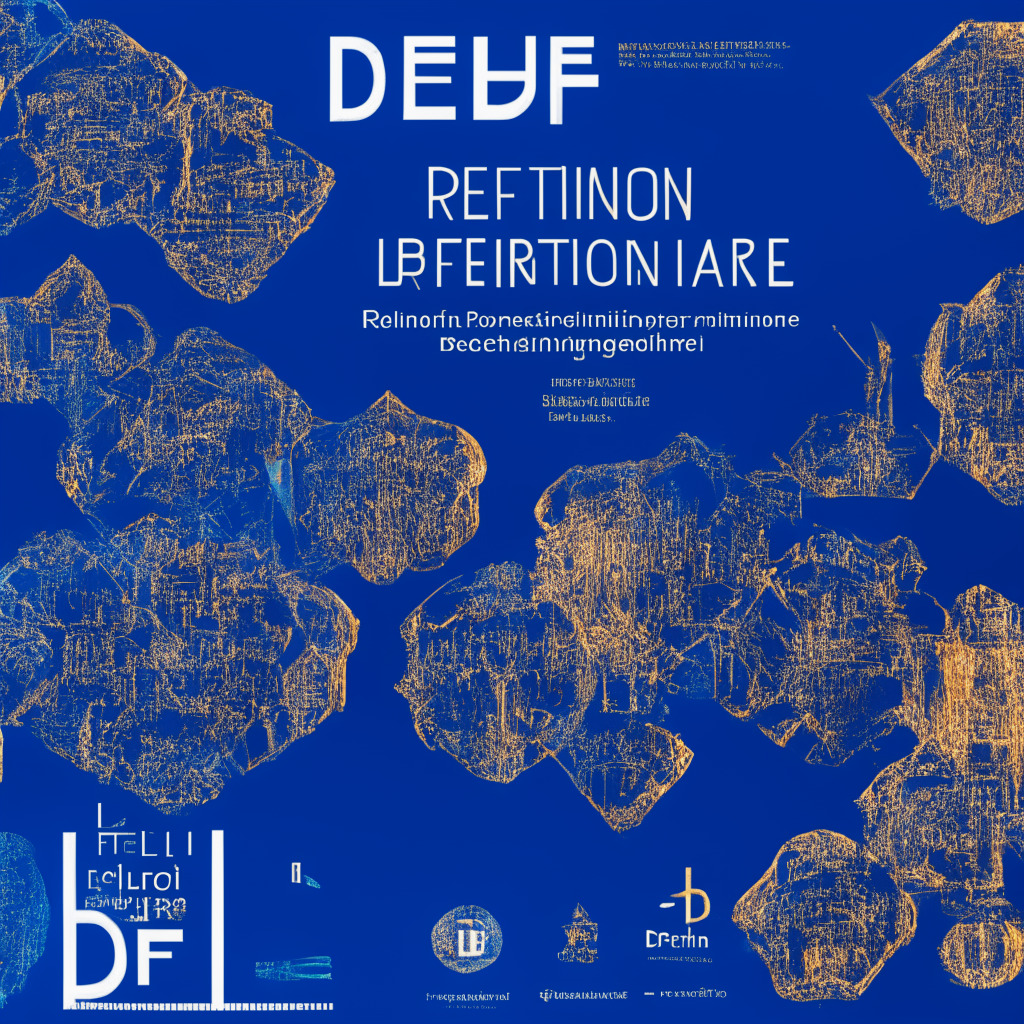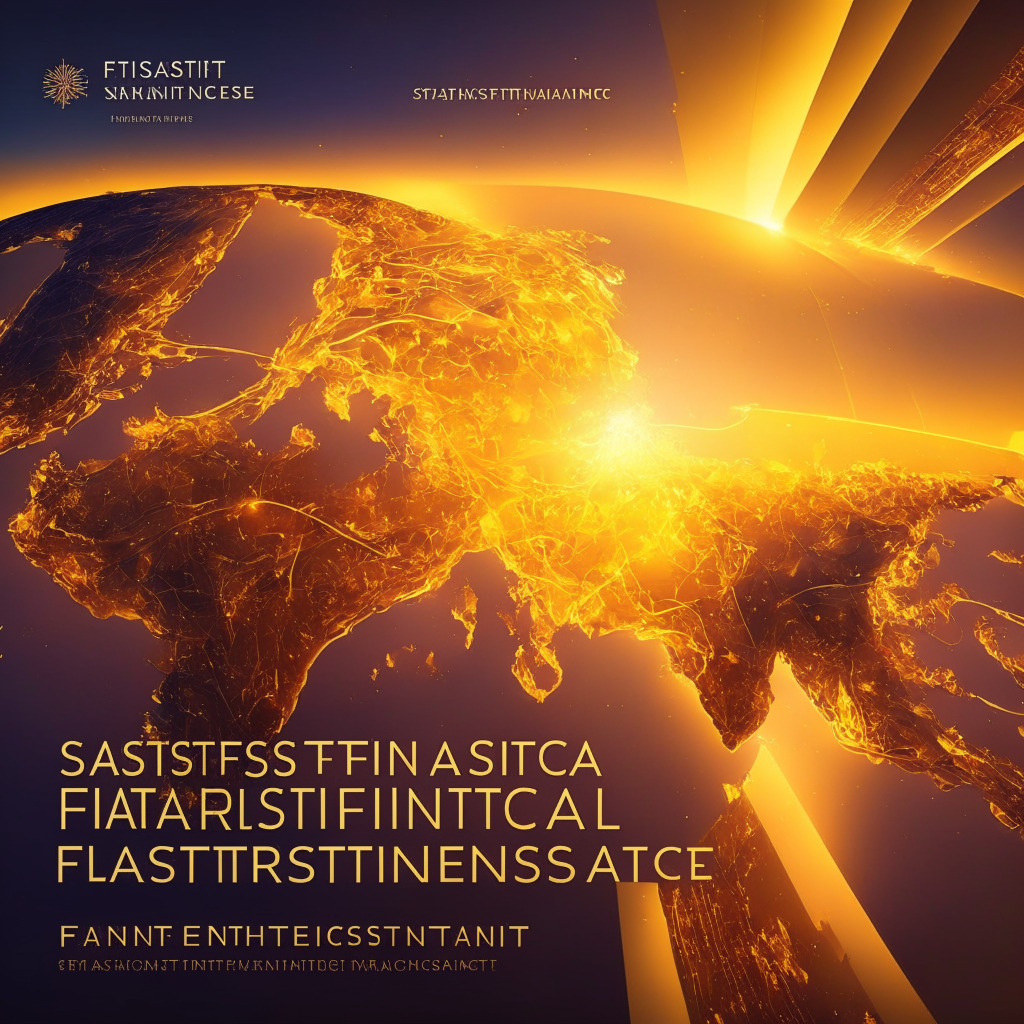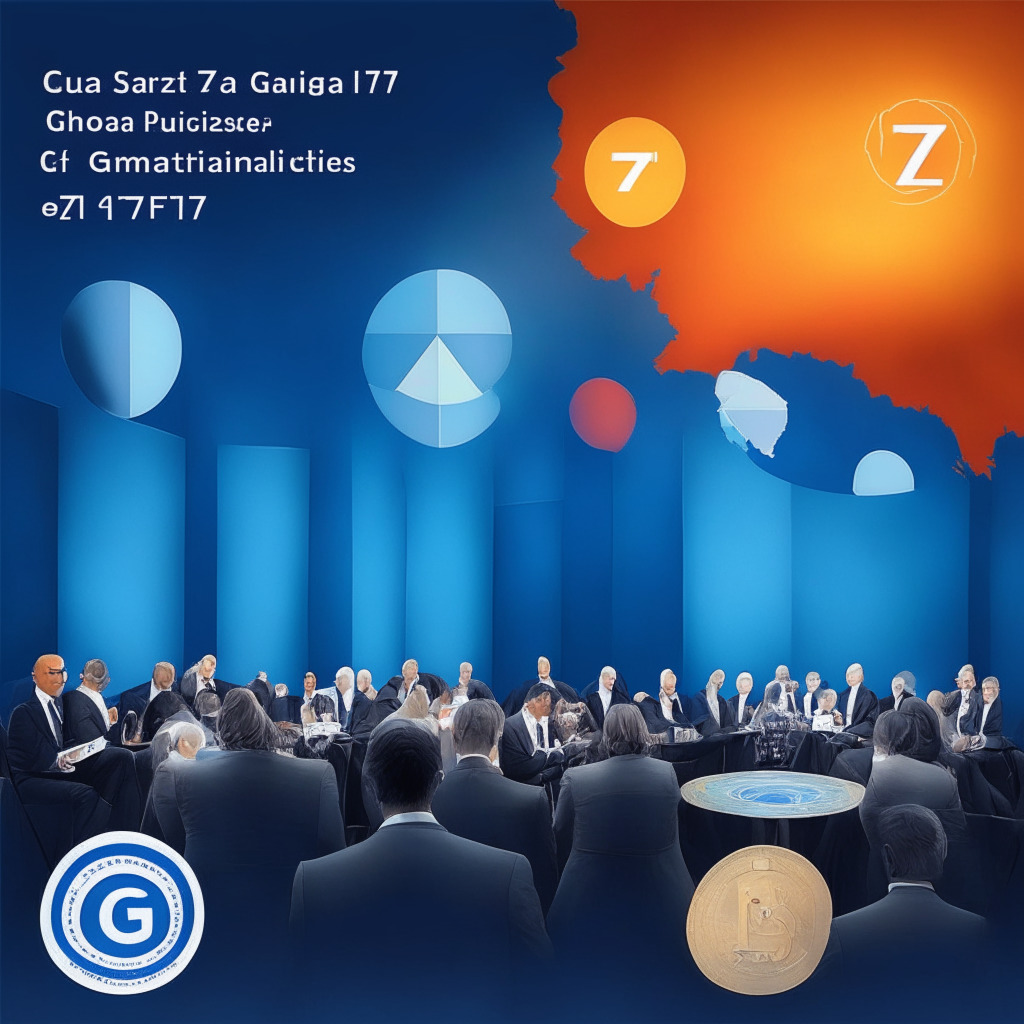“G20 leaders have emphasized the need for global coordination on crypto regulations. The IMF managing director likens crypto to water, stating that it always finds its way out. Amidst heated discussions, India pushes for a globally coordinated approach, despite internal resistance and the country’s unique crypto issues.”
Search Results for: Financial Stability Board
Massachusetts’ Scrutiny on AI in Securities: Protecting Investors or Stifling Innovation?
Massachusetts authorities have initiated a probe into business interactions with AI, its impact on investors, and its potential misuse in the securities industry. The investigation seeks to ensure AI systems do not subtly prioritize firm interests over clients, reinforcing the need for careful regulation.
India’s Imprint on Global Crypto Legislation: A Leaning Tower or A Firm Stance?
India, the current G20 chair, has recently supported a globally aligned legislative framework for digital assets. Amid potential global regulations, India is pushing for a better understanding of the impact of digital currencies on emerging economies. However, it also highlights potential scams in economies with lax cryptocurrency regulations, enforcing the need for a globally aligned regulatory structure.
Crypto’s Legal Labyrinth: Analyzing Recent Litigations, Regulations and Their Impact on the Industry
The cryptocurrency community has been hit by various legal and regulatory changes recently, surrounding issues like fraudulent activities, securities violations, and money laundering investigations. These developments demonstrate the dynamic challenges faced when crypto technology interacts with traditional financial structures. For a robust future, it’s crucial that the pace of regulations matches the innovation in this field.
Global Digital Currency Race: Stablecoins Threat or CBDCs Safety?
“The race for global digital currency dominance has stablecoins and Central Bank Digital Currencies (CBDCs) in the lead. However, Rabi Sankar, Deputy Governor of the Reserve Bank of India, warns that stablecoins could pose significant policy sovereignty risks for certain nations.”
Australia Risks Falling Behind in Crypto Race: How Regulations and Education Can Help
Australia’s crypto industry risks falling behind emerging markets like Bermuda, Mauritius, and Nigeria. In order to remain competitive, the country must develop and implement robust crypto regulations. Collaboration between industry, academia, policymakers, and government bodies is crucial for devising effective solutions to foster innovation and growth within the crypto ecosystem.
Expanding Crypto Trading on Tel Aviv Stock Exchange: Pros, Cons, and Global Regulation Debate
The Tel Aviv Stock Exchange plans to allow nonbanking member customers to trade cryptoassets, expanding authorized activities. Meanwhile, the IMF and FSB aim to develop a coordinated global crypto regulation approach. In other news, private investment firm ABO Digital launched, supporting the digital asset space, and Push Protocol revealed a group chat feature for its Web3 messaging app.
Globally Coordinated DeFi Regulation: Balancing Innovation and Investor Protection
France’s top markets regulator, the Autorité des Marchés Financiers (AMF), calls for a globally coordinated approach to decentralized finance (DeFi) regulation, aiming to protect investors and foster innovation. The AMF highlights the challenges in categorizing and regulating DeFi protocols, emphasizing the need for consistency and uniformity in regulations across borders. A globally coordinated approach could potentially shape the DeFi industry’s future, ensuring a level playing field while promoting innovation and investor protection.
Circle’s New Chief Legal Officer: A Path to Compliance or Regulatory Crackdown?
Stablecoin issuer Circle appoints Heath Tarbert as chief legal officer to tackle ongoing regulatory crackdown on cryptocurrencies. Tarbert’s expertise in highly-regulated industries aims to navigate complex regulatory landscapes, balancing innovation and compliance amidst increased scrutiny in the crypto industry.
G-7 and G-20 Divide: Stablecoin Regulation Impact on Advanced and Emerging Economies
A divide between advanced and emerging economies on stablecoin regulations is hindering the establishment of global norms. The G-7 supports regulating stablecoins, while the G-20 expresses concerns about their potential impact on monetary policy and financial stability, advocating stricter regulations or prohibitions. This divergence could delay adopting a comprehensive regulatory framework for the cryptocurrency sector.
G-7 and G-20 Nations Divided over Stablecoin Regulations: Impact on Global Crypto Adoption
Global leaders are creating universal rules for the crypto sector; however, G-7 advanced economies favor allowing and regulating stablecoins, while emerging G-20 economies voice concerns for stricter restrictions. This disagreement could hinder global acceptance of stablecoin norms and fragment unified oversight.
Expanding Crypto Conversations: RBI, Global Impact, and the Path to Unified Regulations
The Reserve Bank of India (RBI) has shifted its focus from individual nations and customers to the potential global risks of cryptocurrencies, emphasizing the need for unified international regulation. As the G-20 presidency holder, India aims to establish comprehensive crypto management frameworks to navigate the evolving landscape of digital currencies and their economic impact.
Crypto Regulation Showdown: Balancing Innovation & Investor Protection in a Decentralized World
The International Organization of Securities Commissions (IOSCO) seeks public comment on policy recommendations for crypto and digital asset markets, addressing market abuse, client asset protection, and disclosures. Their Fintech Task Force aims to establish a regulatory agenda for fintech and cryptocurrency industries, with oversight from the Monetary Authority of Singapore. Recent events highlight the need for increased regulation, and IOSCO’s initiative seeks to create a more secure environment in the digital asset industry.
G-7 Urged to Regulate Cryptocurrency: FATF Recommendations and Global Compliance
FATF President Raja Kumar urges G-7 finance ministers to address cryptocurrency regulation and implement recommendations tackling money laundering, terrorist financing, and virtual safe havens for unlawful transactions. Compliance with updated crypto requirements remains low, with 73% of countries, including G20 nations, partially complying with FATF Standards.
G-7 Finance Ministers Embrace Crypto Regulation and Central Bank Digital Currencies
The G-7 finance ministers discussed their commitment to regulating crypto-assets and exploring central bank digital currencies (CBDCs) in a recent meeting. They emphasized the need for effective regulatory frameworks while supporting innovation and addressing potential risks to the monetary and financial system.
Scorching Success of Scorpion Casino: Gambling Prospects in Web3 Era and Market Limits
“The expanding popularity of online gambling, particularly within the Web3 sphere, is seeing blockchain projects like Scorpion Casino gain traction. The immutability of blockchain technology offers transparency and fairness not seen in traditional gambling. Scorpion Casino, a versatile platform offering comprehensive betting opportunities, augments price growth stability with deflationary tokenomics, setting it up for a 10X value appreciation in 2023.”
Unpacking Project Atlas: A Centralized Perspective on Decentralized Markets
‘Project Atlas’, pioneered by Bank of International Settlements and various European Central banks, is developing a proof of concept system tracking on-chain and off-chain cryptocurrency transactions. The project aims to understand macroeconomic relevance of cryptocurrency markets and decentralized finance, offering transparency and potential risk mitigation.
Unleashing the Bull: Bitcoin’s Prospects Amid Rising U.S Treasury yields and Looming Economic Unrest
Recent developments in the US economy, such as rising treasury yields and national debt, suggest a bullish future for Bitcoin. Former crypto exchange CEO, Arthur Hayes, speculates this could lead to mass liquidity injections, possibly triggering a Bitcoin bull run. However, the volatile interplay between these economic factors also warrants caution.
Singapore’s Crypto Embrace: Coinbase’s MPI License Triumph and the Double-edged Sword of Security
“Coinbase, the crypto exchange, obtained a Major Payment Institution (MPI) license from Singapore’s Monetary Authority. This approval extends its digital token services in Singapore, augmenting its responsibility towards the expanding crypto and Web3 community. However, potential risks such as hacks, scams, and breaches loom large in the emerging cryptocurrency landscape.”
Regulatory Tug-of-War: The SEC, Blockchain, and the Struggle to Control Crypto Assets
“SAB 121, the SEC’s new regulatory bulletin concerning crypto assets, faces criticism and controversy. Issued without involving key industry bodies, this document has stirred skepticism due to its broad implications for digital asset custody, inherent risks, and the broader crypto space.”
Navigating the Pros and Cons of a Prospective ‘Digital Euro’
The European Central Bank (ECB) discusses its ongoing development of a Central Bank Digital Currency (CBDC) – a digital Euro. The CBDC aims to offer a user-friendly, cost-free alternative to physical cash. Privacy protection, while preventing illegal activities, is emphasized as a fundamental aspect. However, potential creation and acceptance issues raise concerns, and the decision to move forward wouldn’t be decided until later in October.
Dissecting Project Sela: Orchestrating the Safe Future of Central Bank Digital Currencies
“Project Sela showcases the potential of central bank digital currencies (CBDCs), implementing a novel intermediary approach to reduce liquidity risk. Dealing with concerns about cybersecurity and privacy, it signals a future where transactions settle directly on the central bank’s ledger, inspiring global central banks’ digital transformation.”
Journey Towards a US Central Bank Digital Currency: A Rocky Path or a Road to Progress?
The U.S. is still in the “basic research” phase of developing a central bank digital currency (CBDC), according to Federal Reserve Vice Chairman, Michael Barr. He highlighted the importance of gaining backing from legislative bodies, addressing risks posed by stablecoins, and establishing a competent regulatory framework before proceeding with any initiatives.
JPMorgan’s Move into Blockchain-Based Cross-Border Transactions: A Game-Changer or Threat?
JPMorgan is reportedly developing a blockchain-based system for cross-border transactions, alongside a new deposit token aimed at speeding up settlements for corporate clients. These efforts, pending regulatory approval, could encourage other banks to consider blockchain solutions and deposit tokens, amidst challenges from other digital tokens and stablecoin issuers. The future of crypto isn’t just about innovation, but also about maintaining a balance between progress and security.
Unveiling the Digital Euro: Europe’s Step Towards CBDCs and What It Means For You
ECB executive Fabio Panetta recently detailed the European Commission’s plans for a digital Euro, asserting this could establish Europe as a leader in central bank digital currencies (CBDCs). The mission focuses on safeguarding European monetary sovereignty, preserving fiscal freedom, and ensuring privacy and data security. However, concerns remain over the compatibility of a digital Euro with existing financial structures.
The European Digital Euro: Monetary Sovereignty Amidst Rising Private Sector Dominance
“The digital euro, a central bank digital currency (CBDC) proposed by the European Commission, is seen as a new paradigm for preserving monetary sovereignty. It would ensure Europeans maintain access to a public payment option, countering the dominance by private payment services’ standalone solutions. However, its implementation requires a balance between fostering innovation and preserving economic stability.”
Tether’s Booming Stablecoin Reserves: Strategic Masterstroke or Future Liability?
Tether, a recognized stablecoin issuer, saw its reserves surge to $3.3 billion in Q2 2023, showing strategic asset management. The company also reported a 30% quarterly profit increase with earnings exceeding $1 billion. Their portfolio includes other stablecoins and the recent success signifies viable long-term strategies, prompting confidence within the crypto community.
Spot Bitcoin ETF Struggle: Clash Between Innovation and Regulation
The Chicago Board Options Exchange’s BZX Exchange has refiled its spot bitcoin ETF application, partnering with Coinbase under a surveillance-sharing agreement. Yet, the SEC has met these efforts with stringent scrutiny, highlighting inadequacies and emphasizing the need for robust market surveillance agreements for consumer protection.
Navigating Crypto-Sports Partnerships: Lessons from Manchester City’s New Deal with OKX
European soccer champions, Manchester City, and cryptocurrency exchange OKX have broadened their alliance. This move resulted in brand visibility in arenas and player uniforms. However, the precariousness of such partnerships, highlighted by FTX’s downfall, has led to rigorous audits and serious questioning of OKX’s liquidity and stability.
Cryptocurrencies: Gambling or Societal Benefits? Balancing Innovation and Regulation
ECB board member Fabio Panetta argues that cryptocurrencies hold “no societal benefits” and should be treated as gambling, subject to stringent regulatory standards. He emphasizes the importance of regulating crypto-related activities, including DeFi and self-custodial wallets, while acknowledging ongoing efforts such as the new MiCA regulations.
DeFi Tranching: Revolutionizing Crypto Investments for Risk-Averse and Aggressive Investors
Struct Finance introduces an innovative tranching mechanism in the DeFi space, offering tailored financial products for varying risk appetites. This permissionless method allows customized investment models, catering to both conservative and high-risk investors, potentially bringing stability and predictability to crypto investments.
Cryptocurrency Clarity: June 13 Hearing, Regulation, and Market Impact
The upcoming U.S. House Financial Services Committee hearing on June 13 could bring clarity to the cryptocurrency market, addressing regulatory compliance, investor protection, and market stability. Proposed legislation may regulate crypto assets and exchanges, stabilizing markets and fostering industry advancements. Investors are eyeing various cryptos amidst these developments.































